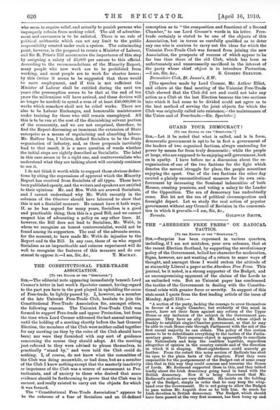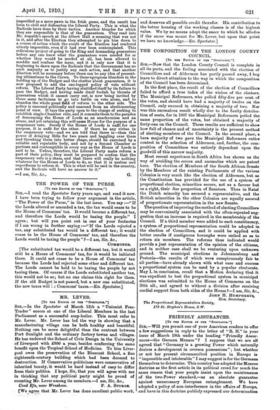THE "ABERDEEN FREE PRESS" ON RADICAL TACTICS.
[TO THE EDITOR OF THE "SPECTATOR."] SIR,—Surprise has been expressed in various quarters, including, if I am not mistaken, your own columns, that at the recent Election Scotland, by supporting the revolutionary policy of the Government, belied her character for moderation, Signs, however, are not wanting of a return to saner ways of thought, and amongst these I would reckon the attitude of so staunchly Liberal a paper as the Aberdeen Free Press. This journal, be it noted, is a strong supporter of the Budget, and an uncompromising opponent of the claims of the Lords to an unlimited veto. But no Unionist paper has condemned the tactics of the Government in dealing with the Constitu- tional crisis with greater force or severity. In support of this statement I quote from the first leading article of the issue of Monday, April 11th :— " A section of the party, lacking the courage to avow themselves in favour of a single Chamber, but evidently of this mind in secret, have set their faces against any reform of the Upper House or any inclusion of the subject in the Government pro- gramme. They have an ally in Mr. Redmond, whose object is frankly to establish single-Chamber government, so that he may be able to rush Home-rule through Parliament with the aid of the first casual majority he can obtain. The policy of this section seems to be to subordinate everything to the tactics of the Parlia- mentary game. Their supreme object is apparently to conciliate the Nationalists and keep the coalition together, regardless altogether of opinion in the country outside and of the direction in which it is shaping. Short-sightedness could scarcely go further. From the outset this noisy section of Radicals has shut its eyes to the plain facts of the situation. First they were responsible for the postponement of the Budget out of some crazy idea that in this way they could concuss and terrorise the House of Lords. Mr. Redmond supported them in this, and they talked loudly about the Irish democracy going hand in band with the British democracy. Now it is being discovered that Mr. Redmond's motives are very different. He insists on the holding up of the Budget, simply in order that be may keep the whip- hand over the Government. He is not going to allow the Budget to pass unless Mr. Asquith does as he bids him. So much for Irish devotion to British democracy. The Budget, which should have been passed at the very first moment, has been hung up and imperilled as a mere pawn in the Irish game, and the result has been to chill and dishearten the Liberal Party. This is what the Radicals have done by their tactics. Another blunder for which they are responsible is that of the guarantees. They read into Mr. Asquith's speech at the Albert Hall a meaning that was not in it, and after the Election they attempted to pin him down to a course of action which the result of the Election had rendered utterly impossible, even if it had ever been contemplated. This ridiculous project of going to the King and demanding guarantees before any one knew what the guarantees were needed for or whether they would be needed at all, has been allowed to muddle and confuse the issue, and it is only now that it is beginning to dawn upon the Radicals that the Government has no such majority as to justify any such action, and that another Election will be necessary before there can be any idea of present- ing ultimatums to the Crown. To these'egregious blunders in the holding up of the Budget and the chatter about guarantees, it is now proposed to add the one-legged policy of veto without reform. The Liberal Party having stultified itself by its failure to pass the Budget, and having made itself foolish by threats of guarantees which it cannot carry out, is now being invited by these same tacticians to go into battle on veto alone, and to abandon the whole great field of reform to the other side. The policy is unsound politically and unsound from an electioneering point of view. It lays the party open to the charge of seeking to establish single-Chamber rule, and it commits them to the paradox of denouncing the House of Lords as an anachronism and an abuse, and yet retaining this self-same House for the purpose of a suspensory veto. Surely if the House of Lords is unfit for one purpose, it is unfit for the other. If there be any virtue in the suspensory veto—and we are told that there is—then this power of delaying Bills for two years and haggling over them and threshing them into better shape, should be exercised by a reliable and reputable body, and not by a Second Chamber so partisan and contemptible in every way as the House of Lords is said to be. Unless, therefore, the Liberal Party make reform a part of their policy, they must be prepared to confess that the suspensory veto is a sham, and that there will really be nothing whatever for the House of Lords to do, so that it is useless and superfluous to reform it. This is what will be said in the country, and the Radicals will have no answer to it."















































 Previous page
Previous page